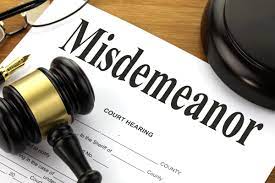What are the Minor hit and run charges -penalty for hit and run no injuries?
You had a minor fender bender, but now you’re facing hit-and-run charges? Don’t panic, in this article, I’ll break down the penalties/charges for a hit and run with no injuries.
Hit and runs can be a confusing and stressful experience, but it’s important to understand the legal repercussions of your actions. If you’re facing minor hit-and-run charges with no injuries involved, you may be wondering what kind of penalty you’re facing.
The good news is that the penalties for a hit and run with no injuries are typically less severe than a hit and run with injuries. However, the specific penalties will vary depending on the state and the circumstances of the case. But don’t worry, I’ve got you covered and I’ll explain it all in this article.
Page Contents
Understanding Minor Hit and Run Charges
What Constitutes Minor Hit and Run Charges?
Hit and run can be defined as the type of auto accident in which one of the drivers flees the accident scene without sharing personal information and rendering the required assistance to the injured.

According to car accident laws and regulations, each driver is required to stop and offer assistance to the injured, and share information with the other driver like names, addresses, contact numbers, car registration information, any car insurance coverage, and license plate.
Legal Consequences of Minor Hit and Run Charges
Failure to observe car accident laws and regulations is an offense and is punishable by law.
In my opinion, the 2 types of hit-and-run car accidents are property damage hit and run, and then injury hit and run.
Property hit and run is a situation when you hit another car, building, or any other object and leave the scene without sharing your contact information. All property hit-and-runs are classified as minor cases of a hit-and-run.
Injury hit and run is the type of accident where the accident you caused causes injuries or death but you illegally leave the scene without sharing your contact and also offering the required help.

Severe types of hit-and-run involve moderate-to-severe injuries and also deaths. Though police are required to investigate all types of hit-and-runs, they are more likely to aggressively investigate the case only if it’s a major hit-and-run case.
Charges of hit and run are so harsh and you could soon be battling charges of misdemeanor or felony depending on where you come from, and the car accident laws in your area of jurisdiction.
Penalties for minor hit-and-run charges differ from state to state. You will be charged with a misdemeanor if you commit a minor hit and run, whereas charges of a felony are slapped to drivers that committed severe forms of hit and runs.
Here are 6 examples of penalties/charges for minor hit and runs.
1. If you live in Los Angels or California, you will likely face a jail time of 6 months in county prison, or pay a $1,000 fine or both.
2. For people in the UK, charges/penalties for minor hit and run include up to a $6194 fine, and up to 26 weeks in prison, depending on the severity of your case.
3. In Texas, a minor hit and run will earn you fines in the range of $500-$2,000 or jail time of up to 6 months or both.
4. In Nebraska, a misdemeanor or a minor hit and run carries jail time of up to 6 months and or a fine of $1,000.
5. If you are living in Colorado, a misdemeanor or a minor hit and run carries a jail time of up to 6 months and or a fine of $750.
6. Just like in Nebraska and California, charges/penalties for minor hit and run or a misdemeanor carry fines of up to $1,000 and jail time of up to 180 days.
Defending Against Minor Hit and Run Charges
How to Plead Not Guilty to Minor Hit and Run Charges
You have a right to defend a hit and run in courts and deny all the charges if you are sure you did not commit the offense.

To plead not guilty to a hit and run, follow the following steps.
1. Hire an experienced car accident attorney. These lawyers know how to navigate the legal systems in your state and have experience in proving your innocence.
2. Gather evidence: Collect any evidence that supports your innocence, such as witness statements, photos of the scene, and any video footage.
3. Review the prosecution’s case: Review the evidence that the prosecution has against you and look for any inconsistencies or weaknesses.
4. Prepare your defense: Work with your attorney to develop a defense strategy that explains why you are not guilty of the charges.
5. Negotiate a plea bargain: If the evidence against you is strong, your attorney may negotiate a plea bargain with the prosecution. This could involve pleading guilty to a lesser charge in exchange for a reduced sentence or fine.
The Role of Eyewitnesses and Evidence in Minor Hit-and-Run Cases
You may not commit a hit-and-run but still, be charged if you have no strong evidence.
For example. You had an accident, stopped by and exchanged contacts and other pieces of information with the other driver, and left the scene. Soon after you left, the other driver’s internal injuries escalate, and blacked out or goes into a comma.
In such situations, you could be charged for a hit and run just because maybe the other driver changes statements, loses your contact, or just because you did not render any help.
For your information, Eyewitnesses and evidence play a crucial role in minor hit-and-run cases as they can provide crucial information to determine the guilt or innocence of the accused.
Differences Between Minor and Felony Hit and Run Charges
To simplify things for you, a felony is a charge that will be slapped onto you if you committed a serious hit and run. For instance, you will be charged with a felony if the hit and run you caused resulted in serious injuries or deaths.
On the other hand, you will be charged with a misdemeanor if you committed a minor hit and run. The main difference between minor and felony hit-and-run charges is the level of injury or damage caused, with felony charges being more severe and resulting in harsher penalties.
I committed a hit and run how long will it take for the police to find me
To investigate any hit and run, the police will use any information or lead available. For instance, the hit-and-run victim will need to produce things like witness statements, car accident footage, photos of the accident scene, and names of the offender.
But, of course, getting such pieces of evidence in the hit-and-run is not easy. In fact, more than 85-90% of hit and runs have no concrete evidence and are therefore not solved by police.
There is also a belief that police do not want to waste their time and resources to investigate a minor hit and run especially if there is no significant evidence or sufficient lead.

If the police have sufficient evidence and good lead, they will likely contact you in less than 30 days after you committed a hit and run. For example, Sam who committed a hit and run, said police reached out to him in 3 days.
“I actually knew no one had seen me and so I was sure police would never find me after I committed a hit and run”, says Sam.
“Hey there, it sounds like you’re concerned about a hit-and-run you may have committed, and are wondering how long it will take for the police to find you”, wondered Sam.
“The truth is, it can vary depending on the circumstances of the case. If the police have your name or license plate number, they may be able to track you down relatively quickly”, Sam told me.
“But if they don’t have that information, it may take longer for them to find you. But it’s important to remember that hit-and-run is a criminal offense and the longer you wait to turn yourself in, the more severe the consequences may be”, Concluded Sam.
In my opinion, it’s always best to contact a lawyer and turn yourself in as soon as possible. Your charges will likely be harsh if police spent their limited resources and time to track you down.
Penalty for hit and run no injuries
Sure, so if you’re facing a hit-and-run charge with no injuries, you should know that it’s also considered a criminal offense. The penalties for a hit-and-run accident with no injuries can vary depending on the state you’re in.
But hit and run with no injuries is considered a misdemeanor, and if you are convicted, you may face fines, probation, community service, and a possible jail sentence of up to one year.
And that’s not all, your driver’s license could also be suspended or revoked and your insurance rates may increase.
You also need to remember that each state has different laws and regulations so it’s always best to check with a lawyer to understand the specific laws of your state and the potential penalties you may face.
Reporting and Handling Minor Hit and Run Accidents
How to Report a Minor Hit and Run Accident to the Police
You are required to report any car accident to the authorities. If you had an auto accident, police should be invited to the scene to compile a car accident police report.
Police report help in determining which driver caused the accident, and any traffic violations or citations the drivers received. The police report also helps you if you need to file a compensation claim through your insurance company.
For you to report a minor hit-and-run accident to the police, call 911 or the non-emergency police number, provide the location, describe the vehicle and the driver, and provide any other relevant details.
The Impact of Minor Hit and Run Charges on Your Auto Insurance
Committing a hit-and-run has many legal implications and affects your insurance rates too. Your insurance company will likely punish you by raising your car insurance rates.

Minor hit-and-run charges can have a significant impact on your auto insurance, as insurance companies may consider it a serious offense and may raise your rates or even cancel your policy.
If you are a hit-and-run victim, your insurance rates will not increase because you were not at fault for the car crash.
The Statute of Limitations for Prosecution of Minor Hit and Run Charges
The statute of limitations is the time within which you are required to file a personal injury lawsuit. An injured person has no forever time to file his/her insurance claim. Different states have different deadlines.
Just like personal injuries, you also need to report a hit and run within a specific amount of time.
Below are examples of the statute of limitations.
1. In Colorado, the statute of limitations for hit-and-run charges varies depending on the nature of the crime. For a felony charge, the victim has a three-year window to file charges, while a misdemeanor charge must be brought within 18 months. For a traffic misdemeanor, the victim has 1 year and for a petty offense charge, the victim has 6 months to file the charges.
2. Hit-and-run victims in Texas have up to 2 years to file misdemeanors lawsuits, and 3 years for felonies.
3. In California, you will need to file a hit-and-run lawsuit within 1 year for a misdemeanor, and 3 years for a felony. If the case involves deaths, you will not be limited by any timeframe.
4. In Florida, you have up to 2 years to file a hit-and-run lawsuit if your loved one died in a hit-and-run accident. You also have up to 4 years to bring a personal injury lawsuit in Florida.
In short, the statute of limitations for prosecution of minor hit and run charges varies by state, but generally, it’s a certain period of time after the incident occurs within which the state can bring criminal charges against the offender.
I, therefore, recommend checking with a lawyer or your local law enforcement to understand the specific laws of your state. You do not want to miss out on filing your hit-and-run lawsuit by failing to meet the required deadline.
Navigating the court process for minor hit-and-run charges is very overwhelming. You will need to seek the services of a defense car accident attorney to stand a chance of beating a hit-and-run lawsuit.

If you are the victim of a hit-and-run car accident, hiring a car personal injury lawyer increases your likelihood of winning the lawsuit and getting the maximum possible compensation.
In short, to navigate a minor hit-and-run charges court process, you need to hire an attorney, review evidence, prepare a defense, attend court appearances, negotiate a plea bargain, and attend the trial, and sentencing.
Conclusion
To sum it up, Minor hit-and-run charges can result in penalties such as fines and community service, but generally do not result in jail time if there were no injuries involved. It’s always best to stop and exchange information in case of an accident.



Pingback: Can You Get Arrested For A Minor Hit-and-run Accident?- A Car Accident Attorney » Car Accident & Personal Injuries »